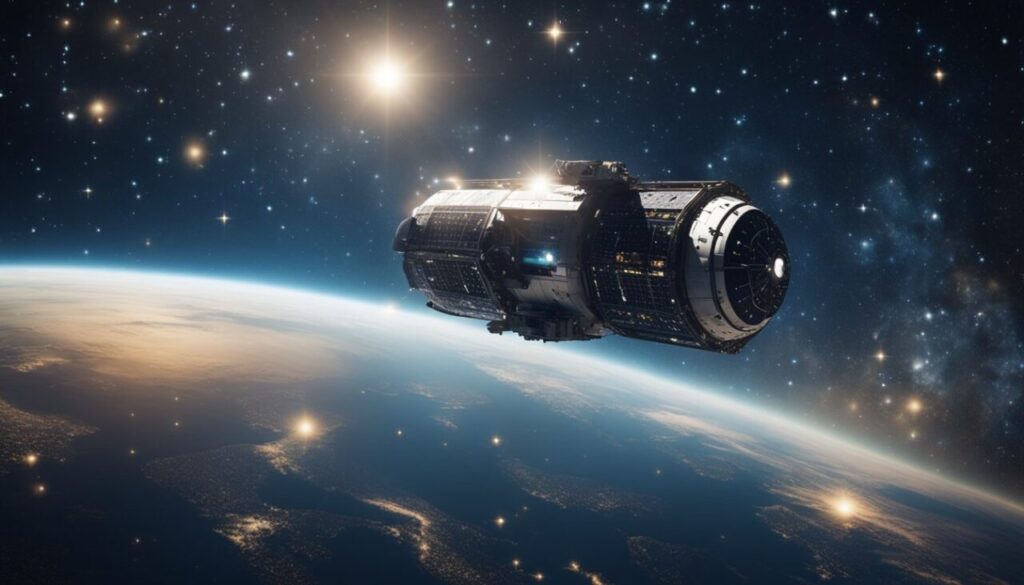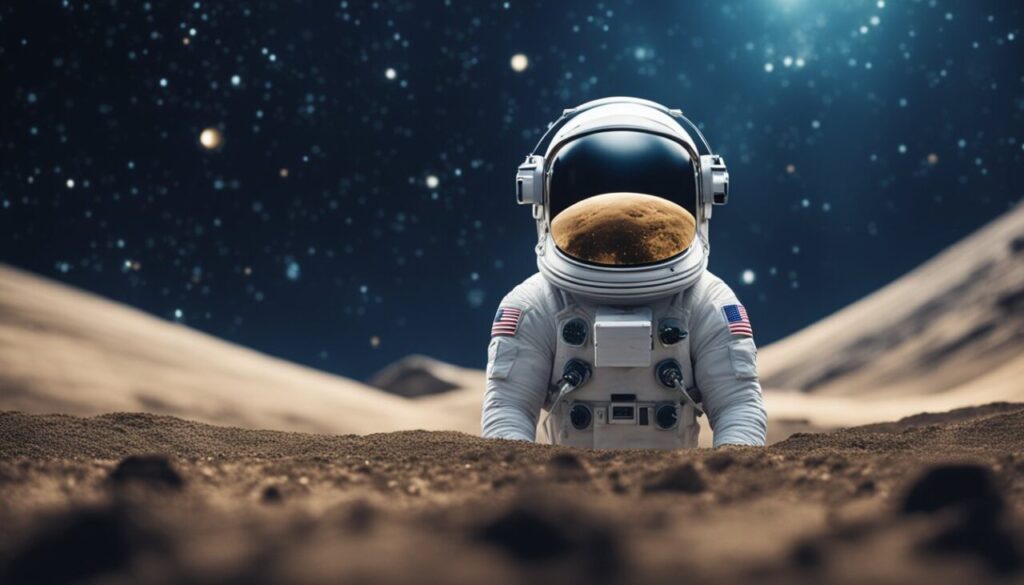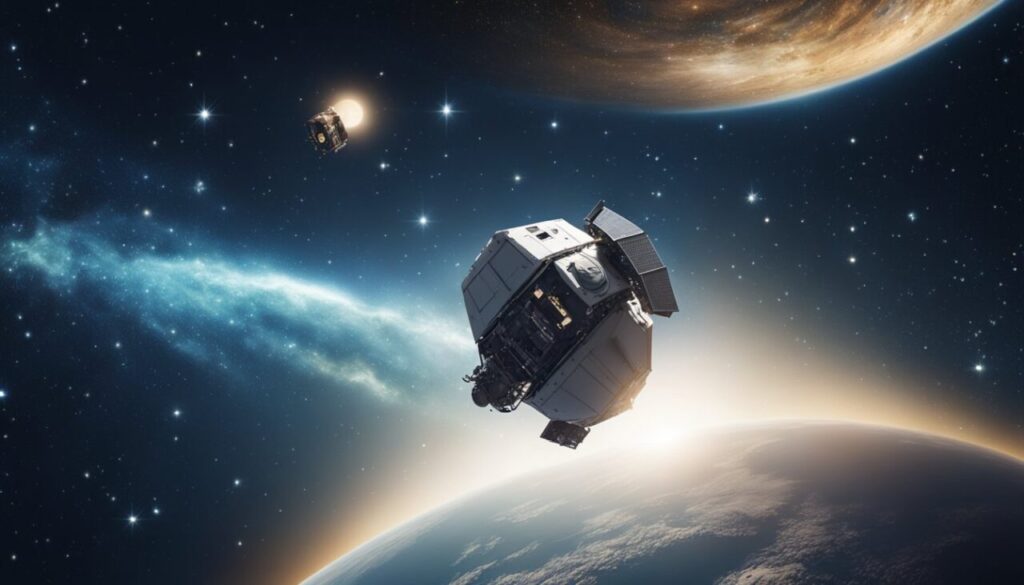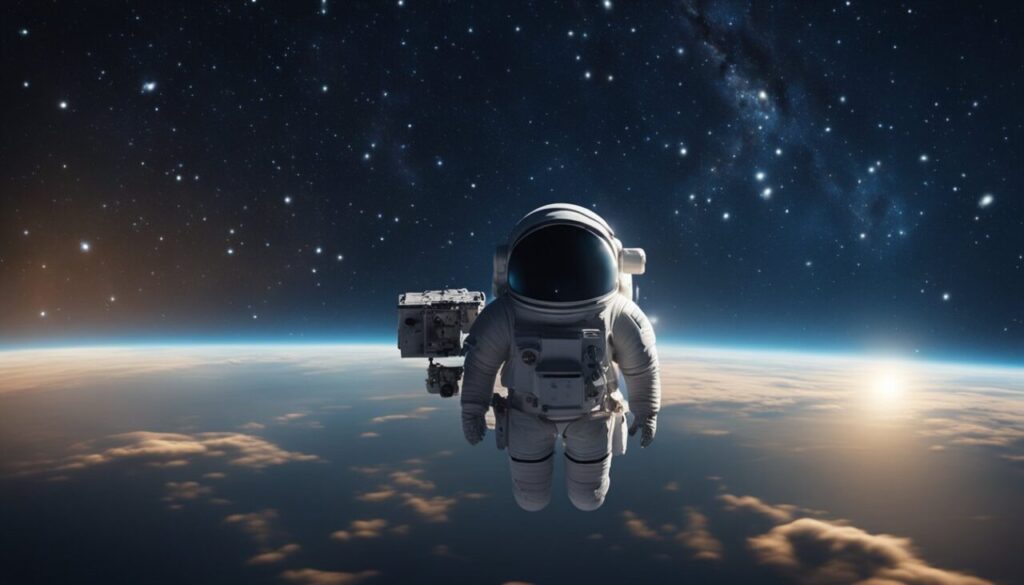
As technology advances, the possibility of space tourism and exploration will most certainly become a reality.
However, with this excitement comes the potential for danger. Namely, one of the risks associated with space travel is the possibility of getting lost in space.
For example, if an astronaut were to become separated from their spacecraft, they would be in an incredibly dangerous situation.
Without the proper equipment and resources, survival in space would be nearly impossible.
The vacuum of space would quickly lead to dehydration, hypothermia, and asphyxiation. Additionally, exposure to radiation and micrometeoroids would pose a serious threat to the astronaut’s health.
And so, let’s explore all those potential consequences in more detail.
Interesting fact: In 1965, astronaut Ed White became the first American to conduct a spacewalk. During his spacewalk, Ed White floated freely in space outside the spacecraft, connected only by a tether.
The Vacuum of Space

As mentioned, when someone gets lost in space, they are exposed to the vacuum of space. This means that they are in an environment with no air pressure or atmosphere. The vacuum of space presents several hazards that can be fatal to humans.
Lack of Oxygen
The lack of oxygen in space means that humans cannot breathe. Without oxygen, the body cannot produce energy, and the brain cannot function properly. This would then lead to unconsciousness and death in a matter of minutes.
Extreme Temperatures
Space is an incredibly cold and hot environment. In the absence of an atmosphere, there is nothing to regulate temperature. When in direct sunlight, temperatures can reach up to 250 degrees Fahrenheit (121 degrees Celsius). When in shadow, temperatures can drop to -250 degrees Fahrenheit (-156 degrees Fahrenheit).
Therefore it is clear that any person floating in space would die very soon either because of extreme cold or extreme heat.
Interesting fact: The coldest temperature ever recorded in space was -459.67 degrees Fahrenheit, also known as absolute zero.
Radiation Exposure
Space is filled with radiation from the sun and other sources. Without the protection of the Earth’s atmosphere and magnetic field, humans are exposed to high levels of radiation.
This can damage DNA and lead to cancer, radiation sickness, and death.
However, radiation would not damage a person immediately. Not in a deadly way at least.
What would happen is that probably a person floating in space would experience acute radiation sickness. This would quickly lead to symptoms such as nausea, vomiting, and fatigue.
And so this poses the following question:
How Many Astronauts Got Lost in Space?

Over the years, there have been only a few incidents where astronauts have become lost in space, with varying degrees of severity.
One of the most well-known kind of incident occurred in 1965 during the Gemini 4 mission. As mentioned, astronaut Ed White became the first American to perform a spacewalk, but when it was time to return to the spacecraft, he had trouble getting back inside.
He eventually made it back safely, but the incident highlighted the dangers of spacewalking and the importance of careful planning and preparation.
Then, Bruce McCandless, an American astronaut, achieved an interesting milestone in space exploration by conducting the first untethered spacewalk using the Manned Maneuvering Unit (MMU) during the STS-41-B mission in 1984.
His famous photograph, depicting him floating freely in space with Earth in the backdrop, became an iconic symbol of human space exploration.
It could be said that Bruce actually became first person really lost in space, but only for a brief period of time.
Then we have a really tragic incident that occurred in 1971 during the Soviet Soyuz 11 mission. Three cosmonauts were on board the spacecraft, and they were returning to Earth after spending several weeks in space.
However, a valve in the spacecraft’s air supply system malfunctioned, causing the crew to lose consciousness and eventually die.
And so, this raises the following question: How many people have died in space overall?
Well as of 2024, in-flight accidents have claimed the lives of 15 astronauts and 4 cosmonauts in five separate incidents.
Three of these flights had surpassed the Kármán line (the official edge of space), while one was intended to do so.
In each of these accidents, the entire crew perished.
As of writing this posts a total of 676 people have traveled into space, with 19 fatalities recorded.
Can You Float Away In Space Forever?

One of the most common fears associated with getting lost in space is the possibility of floating away forever.
While it is true that an astronaut who becomes untethered from their spacecraft could float away, they would not float away forever.
In space, there is no air resistance to slow down an object’s motion.
Interesting fact: In 2013, Italian astronaut Luca Parmitano nearly drowned in his spacesuit during a spacewalk when a water leak caused his helmet to fill up with water. He was able to make it back to the spacecraft safely, but the incident raised concerns
Therefore, if an astronaut were to become untethered from their spacecraft, they would continue to move at the same speed and direction as the spacecraft.
However, they would not continue to accelerate as there is no force acting on them.
Eventually, due to the gravitational pull of nearby celestial bodies, the astronaut’s trajectory would change, and they would either be pulled towards another object or enter into orbit around it.
And so that leads us to the final question.
How Long Until Body Decomposes in Space?

Well, in space, the process of decomposition would be very different from that on Earth due to the absence of key environmental factors such as oxygen, moisture, and microbes.
However, if we consider a scenario where a body is exposed to outer space without any protection, it would undergo a process called desiccation, where the water in the body would rapidly evaporate due to the vacuum environment.
This would cause the body to dehydrate and become freeze-dried.
Then, the body would undergo some level of chemical changes due to exposure to cosmic radiation and ultraviolet light, but the process would likely be much slower compared to decomposition on Earth.
In short, the exact timeline for decomposition in space would depend on various factors such as the distance from a star (and hence the amount of radiation received), the presence of microorganisms or other biological agents, and whether the body is protected by any kind of spacesuit or spacecraft.
But generally, decomposition in space would take much longer than on Earth, potentially stretching into years or even decades.
Conclusion

And so, to answer the question posed at the beginning of this article—what would happen if you were to get lost in space or end up floating in space?
Well, in short—you would die very quickly.
It probably wouldn’t be very painful as you would lose consciousness rapidly.
So, in a way, it would be a glorious way to go, as you would have the best view possible, but it would happen very quickly.
After that, your body would continue floating in space, slowly decomposing.
It’s likely a better scenario (and less painful) than falling into a black hole, as we’ve discussed in our article titled:
“What would happen if you fell into a black hole?”
Note: If you’re interested in similar articles, on topic of “What would happen if”, you can check:
- What would happen if Moon disappeared?
- What Would Happen If The Moon Exploded?
- What Would Happen If Jupiter Disappeared?
- What Would Happen If You Fell Into A Black Hole?
- What Would Happen If The Moon Exploded
- What Would Happen If The Earth Stopped Spinning?
- What If Everyone On Earth Jumped At The Same Time?
- …and many more.




















